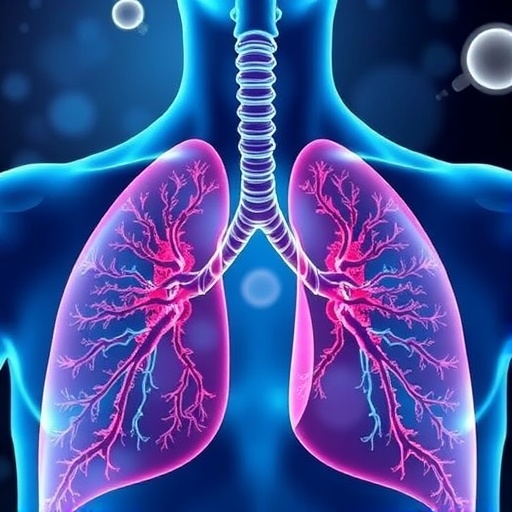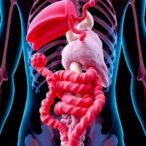
Chronic obstructive pulmonary disease (COPD) is a crippling respiratory ailment that affects millions worldwide, making it a critical focal point for medical research. Recent studies, including groundbreaking research published by Lin, Jiang, Liu, and colleagues, have illuminated the intricate relationship between airway microbiota and the immune responses associated with the severity of COPD. This research underscores the significance of understanding the components of the airway microbiome, as alterations in this ecosystem have been suggested to play a pivotal role in disease progression and exacerbation.
The airway microbiota consists of diverse microbial communities that inhabit the respiratory tract. These microorganisms, which include bacteria, viruses, fungi, and archaea, have been shown to be influential in various lung diseases. In COPD, the complexity of these microbial communities could directly impact the host’s immune system. The study conducted by Lin and team provides a comprehensive analysis of how these microbial populations may correlate with clinical features, revealing insights that could transform therapeutic approaches for managing COPD.
Delving deeper into the mechanisms revealed in this study, researchers found that specific microbial compositions were associated with higher disease severity. Patients with a low diversity of airway microbiota exhibited more pronounced symptoms of COPD, including increased breathlessness and reduced exercise tolerance. The findings suggest that a healthy diversity of microbial species in the lungs may confer some protective benefits, potentially mitigating the intensity of inflammation and lung damage typically seen in COPD patients.
Moreover, the profit of identifying predominant microbial species prevailing in COPD patients can lead to targeted intervention strategies. The authors speculate that enhancing or restoring beneficial microbial populations through probiotics or other microbiome-modulating therapies could serve as innovative therapeutic techniques. The potential for probiotics to act as adjunct therapies in COPD management emerges as a key theme throughout the paper, encouraging further exploration into clinical applications and patient outcomes.
Another fascinating aspect of this research revolves around the interaction between the airway microbiota and the host’s immune system. The study posits that the alteration of microbial populations may trigger aberrant immune responses, exacerbating the inflammatory pathways associated with COPD. Understanding the dynamics of the immune response in relation to the microbiota composition opens up new vistas for therapeutic exploration, including the use of immune modulators tailored to individual microbiome profiles.
The complexity of COPD as a multifactorial disease means that it is crucial to consider environmental factors and lifestyle choices, such as smoking and pollution exposure, which can also dramatically influence the airway microbiota. Lin et al. emphasize this interplay in their study, indicating that lifestyle modifications, alongside potential microbiome therapies, could substantially impact disease progression and patient quality of life. The holistic approach outlined in their research points toward the necessity of integrated treatment strategies.
Additionally, the implications of airway microbiota on COPD extend beyond mere observation. The study illustrates that the microbiome might also serve as a biomarker for disease severity and progression, enabling more precise prognostic tools. Identifying specific microbial signatures in COPD patients could enhance personalized medicine approaches, allowing for customized treatments that align with the individual’s unique microbial ecology. This potential advancement marks a significant leap in understanding the biological underpinnings of COPD and optimizing care.
As the research community continues to explore the vast intricacies of microbial interactions, the insights gained from Lin et al.’s work may pave the way for breakthroughs in the management of COPD. By connecting the dots between airway microbiota, immune responses, and clinical outcomes, health care providers may soon have access to a new arsenal of tools to battle this pervasive disease. The promise of microbiome-based interventions heightens the urgency for further research into this avenue, transforming the landscape of respiratory medicine.
With the publication of these findings, a call to action resonates within the scientific community to prioritize research that explores not only the identification of microbial species but also the functional attributes of these organisms in the context of health and disease. The potential for new treatment modalities rests on the discovery of how specific microbial activities can be harnessed or replicated to restore balance in the lungs of COPD patients.
Furthermore, as our understanding of the airway microbiome deepens, it invites broader considerations of how respiratory health intersects with other systemic conditions. For instance, emerging studies suggest a potential relationship between microbiota composition and comorbidities frequently seen in COPD patients, such as cardiovascular diseases and diabetes. Investigating these links could reveal insights into holistic treatment strategies that encompass not just the lungs but also the wider health of patients.
Continued exploration into the airway microbiota also holds promise for new preventative strategies in COPD. If researchers can uncover how perturbations in the microbiome relate to environmental and lifestyle influences, they may discover avenues for early interventions that could halt disease progression before the onset of clinical symptoms. The concept of preventative microbiome manipulation could revolutionize respiratory health, shifting the focus from treatment to avoidance.
As the obesity epidemic and other lifestyle-related health issues increasingly complicate COPD management, understanding the relationship between metabolic health, microbiota, and the lungs will be a critical area of exploration. With mounting evidence linking bacterial diversity with metabolic processes, there may be profound implications for how we approach COPD in the context of global health trends.
The findings by Lin et al. call for urgent further investigation into mechanism-driven studies that can elucidate the causative roles of the airway microbiome in COPD. Such inquiries are not just academic; they have real-world implications for how we can improve the lives of millions living with this debilitating condition. As thrillans echo through the research corridors, the quest to unravel the complexities of the airway microbiota as it relates to COPD is just beginning.
By nurturing this field of research, we could witness a paradigm shift in how we understand, diagnose, and treat chronic obstructive pulmonary disease. The potential for microbiome-focused therapies holds more than hope—it holds the promise of transformed lives and renewed health for patients navigating the challenges of COPD. Команда Lin и их исследование определенно сделали важный шаг в этом направлении, направив нас к новым и более эффективным способам борьбы с этой тяжелой болезнью.
The future of COPD management is unclear but earnest. The findings from Lin, Jiang, Liu et al. present a clarion call for researchers and clinicians alike. As we step into a new era of personalized medicine driven by the understanding of microbiome interactions, the quest for effective strategies to quell the impacts of COPD will continue unfalteringly. With continued dedication, collaboration, and research, the diagnosis and treatment of chronic obstructive pulmonary disease can evolve in ways previously unimagined, benefiting patients around the globe and reshaping the future of respiratory care.
Subject of Research: Airway microbiota in Chronic Obstructive Pulmonary Disease (COPD)
Article Title: Airway microbiota and immunity associated with chronic obstructive pulmonary disease severity.
Article References:
Lin, Z., Jiang, Y., Liu, H. et al. Airway microbiota and immunity associated with chronic obstructive pulmonary disease severity. J Transl Med 23, 962 (2025). https://doi.org/10.1186/s12967-025-06986-2
Image Credits: AI Generated
DOI: 10.1186/s12967-025-06986-2
Keywords: Airway microbiota, COPD, immune response, disease severity, probiotics, personalized medicine.
Tags: airway microbiome and disease progressionairway microbiota and COPD severityChronic obstructive pulmonary disease researchchronic respiratory disease research trendsCOPD exacerbation factorsCOPD symptom severity and microbiotaimmune responses in COPDLin Jiang Liu COPD studylung disease microbiota interactionsmicrobial communities in respiratory healthrespiratory tract microbiome diversitytherapeutic approaches for COPD



